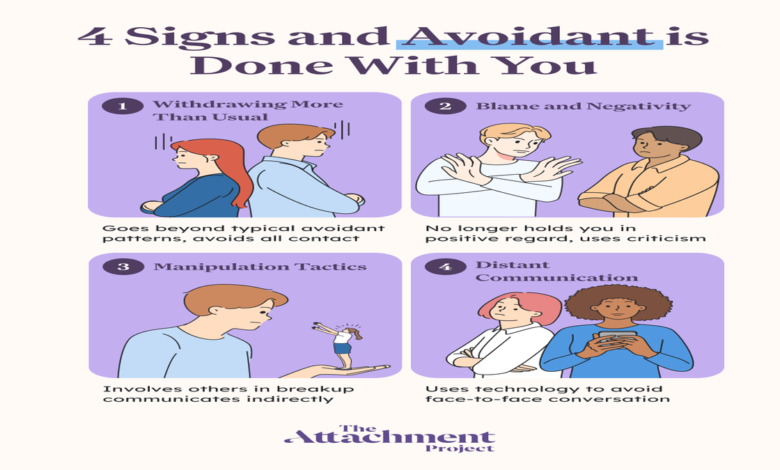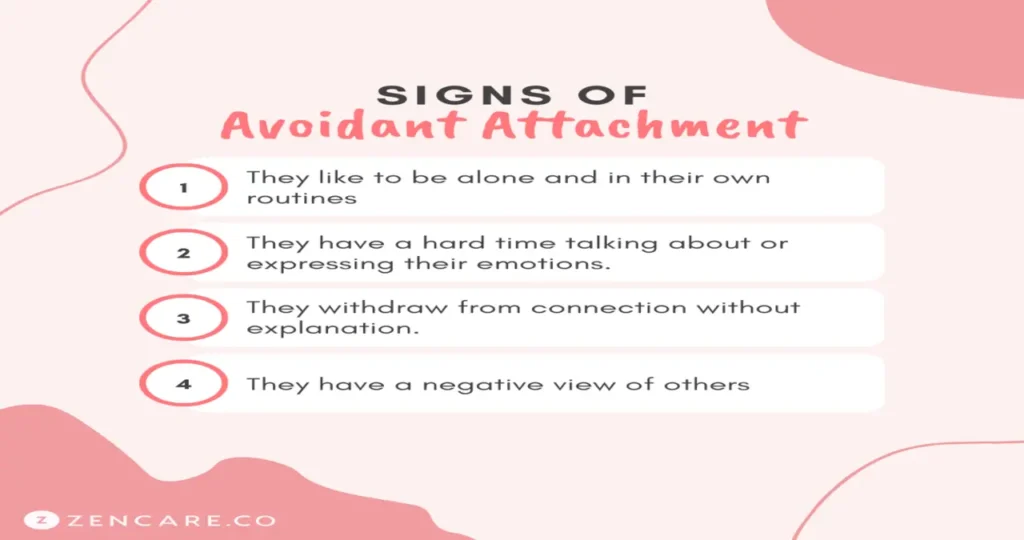Signs an Avoidant Is Done With You: 7 Behaviors That Signal They’re Moving On

Signs an Avoidant Is Done With You attachment styles are known for their emotional distance and self-reliance, making it difficult to tell when they’re truly done with a relationship. Unlike more expressive partners, avoidants rarely announce their feelings outright—instead, they withdraw silently.
If you’ve been sensing a shift in your Signs an Avoidant Is Done With You partner’s behavior but can’t quite pinpoint why, this guide will help. Below are seven key signs an avoidant is done with you and emotionally detaching for good.
1. They Become Emotionally Unreachable

Signs an Avoidant Is Done With You naturally need space, but when they’re truly done, they stop engaging emotionally altogether.
- Minimal responses to deep conversations
- No longer sharing personal thoughts or feelings
- Avoiding discussions about the relationship’s future
Why it matters: Signs an Avoidant Is Done With You who still care will eventually circle back after needing space. If they’ve completely shut down, they may be detaching permanently.
2. They Stop Initiating Contact
One of the clearest signs an Signs an Avoidant Is Done With You is moving on is when they no longer reach out first.
- You’re always the one texting or calling
- Delayed or dry responses when you do communicate
- Excuses like “I’ve been busy” with no effort to reconnect
Key difference: Needing space is normal for Signs an Avoidant Is Done With You, but if they’re done, they won’t try to maintain the connection.
3. They Avoid Physical and Emotional Intimacy
Avoidants often struggle with closeness, but when they’re checked out, intimacy drops to zero.
- Pulling away from hugs, kisses, or affectionate touch
- No longer initiating sex or showing physical interest
- Keeping conversations surface-level to avoid emotional depth
What it means: If they’re not just needing space but actively avoiding intimacy, they may be mentally preparing to leave.
4. They Seem Indifferent to Your Feelings
A major red flag is when an Signs an Avoidant Is Done With You stops caring about how their actions affect you.
- No longer apologizing for hurtful behavior
- Dismissing your concerns with “You’re overreacting”
- Showing no jealousy or concern if you pull away
Why this happens: Avoidants detach to protect themselves—once they’re done, your emotions no longer influence them.
5. They Talk About the Future—Without You
Avoidants rarely discuss long-term plans, but if they suddenly mention solo futures, it’s a bad sign.
- Making career or life decisions without considering you
- Using “I” instead of “we” when discussing the future
- Avoiding any talk of commitment (e.g., moving in together, marriage)
The takeaway: If they’re planning a life that doesn’t include you, they’re likely already moving on.
6. They Become More Social—Without You
Avoidants typically value alone time, so if they’re suddenly more active socially (but exclude you), pay attention.
- Going out more with friends but not inviting you
- Posting more on social media (after being private)
- Seeming happier and more engaged with others than with you
What it signals: They may be filling the emotional void elsewhere, preparing to exit the relationship.
7. They No Longer Argue or Express Frustration
Conflict can be a sign of investment—when Signs an Avoidant Is Done With You stops caring, they stop arguing altogether.
- No longer reacting to relationship issues
- Ignoring problems instead of addressing them
- Giving vague answers like “Do whatever you want”
Final red flag: Indifference is worse than anger. If they’re no longer bothered, they’ve likely detached completely.
What to Do If an Avoidant Is Done With You
If you recognize these signs, here’s how to respond:
✅ Give them space – Pushing for answers may push them away further.
✅ Observe, don’t chase – If they don’t return, their silence is the answer.
✅ Focus on yourself – Avoidants rarely come back unless they initiate.
✅ Prepare to move on – If they’ve emotionally checked out, it’s time to prioritize your well-being.
Final Thoughts
Avoidants rarely give dramatic breakups—instead, they fade away. If you’ve noticed multiple signs from this list, they may already be detaching. The best approach is to match their energy: if they’re done, don’t waste time waiting for closure they can’t give.
Have you experienced an avoidant partner pulling away? Share your thoughts in the comments below.
1. Can an avoidant come back after emotionally detaching?
Answer: Sometimes, but only if they initiate reconnection. Avoidants rarely return unless they feel a genuine need to. If they’ve completely detached, they’re more likely to move on permanently.
2. Do avoidants give closure when they’re done?
Answer: Rarely. Avoidants tend to withdraw silently rather than have a direct breakup conversation. Their disappearing act is their form of closure.
3. How long does it take for an avoidant to detach completely?
Answer: It varies—some detach suddenly after a trigger, while others fade out slowly over weeks or months. Consistent emotional distance is the biggest indicator.
4. Should I confront an avoidant if I think they’re done with me?
Answer: Pushing for answers often makes them withdraw further. Instead, match their energy—if they don’t make an effort, assume they’ve moved on.
5. Can an avoidant still love you but act distant?
Answer: Yes, but love alone isn’t enough. Avoidants may care but prioritize self-protection over connection. If they’re not actively working on closeness, their love may not translate into a sustainable relationship.





